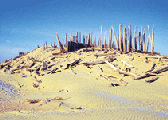 Period:Bronze Age
Period:Bronze Age
Listed in: 2004
Excavated by: the Cultural Relics and Archeological Research Institute of Xinjiang
 Site description
Site description
 The site in Northwest China was first discovered in early last century and excavated in 1934 by a Swedish archeologist. Altogether 167 tombs have been dug up since the end of 2002, unearthing thousands of precious relics.
The site in Northwest China was first discovered in early last century and excavated in 1934 by a Swedish archeologist. Altogether 167 tombs have been dug up since the end of 2002, unearthing thousands of precious relics.
The exterior of the tomb site is an oblong sand dune; more than 30 well-preserved mummies have been excavated from inside the dune. The mummies' well-preserved state is due to them being kept air-tightened in ox-hide bags before they were interred. Tall timbers symbolizing the reproductive organs of males and females stand atop the sand dune and are the cultural traces of the people in Lop Nor area millenniums ago.
